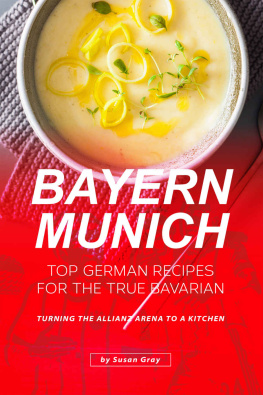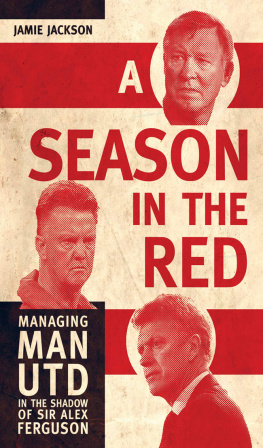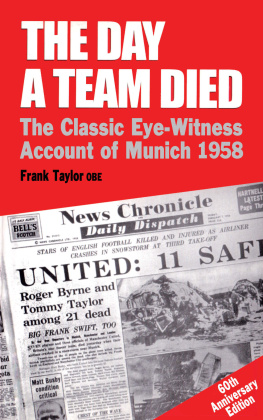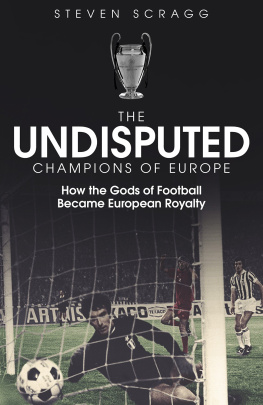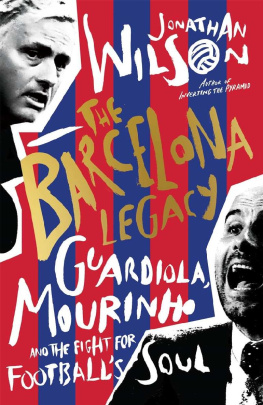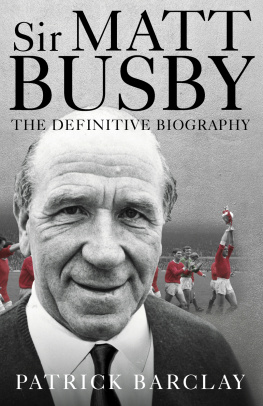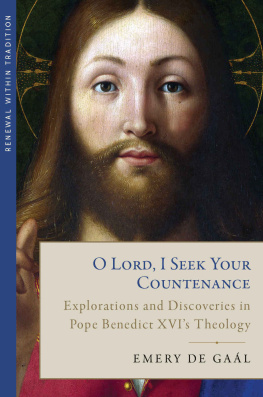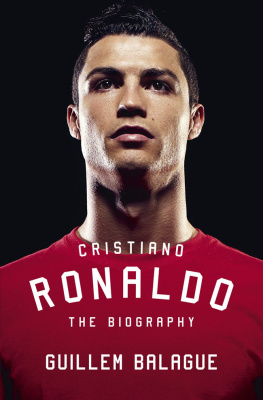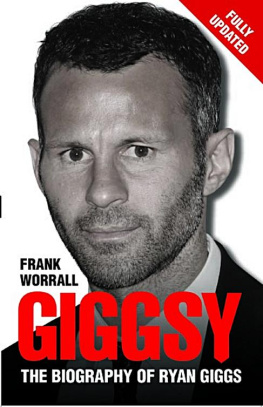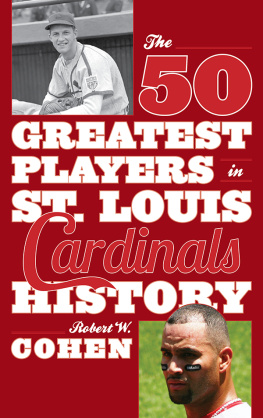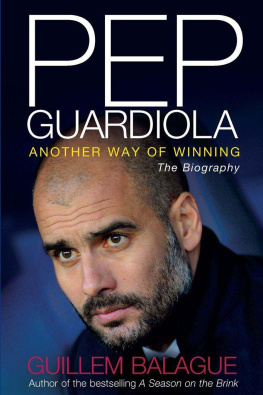CONTENTS
ABOUT THE BOOK
So who is Louis Van Gaal? An inflexible ex-PE teacher who only knows how to act like a dictator or a footballing visionary that has made him one of the greatest ever European managers?
Wherever he has gone, Van Gaal has been accused of being a domineering disciplinarian and a control freak. He is certainly, by his own admission, a man who leaves nothing to chance. A disciple in the 1970s of Rinus Michels Total Football philosophy, he is a fascinating contradiction an ultra-individualist utterly devoted to the collective effort. He believes in the team over the individual, in always having a plan and a team prepared to follow that plan. Van Gaal led the young Ajax team he moulded to Champions League glory in 1995, went on to win titles across Europe with Barcelona, AZ Alkmaar and Bayern Munich and is currently in his second stint as national coach of Holland. It is a career that has never been short on colour and drama from fallouts with players to rants at the media wherever he has managed.
Dutch football commentator Maarten Meijers has written the definitive biography of Van Gaal both the man and his methods. It offers the best psychological insight so far from his earliest roots to his greatest triumphs into the man given the task of returning the glory days to Manchester United.
ABOUT THE AUTHOR
Maarten Meijer spent his childhood years in the small town of Zeist in the Netherlands. After completing his school education, he travelled extensively, from Ireland to Turkey, from Finland to Spain. When Europe became a little small, he sailed a yacht across the Atlantic Ocean to the Americas. After touring the Caribbean islands, he landed in the USA. He enrolled at the State University of New York, receiving a bachelors degree in science and a masters degree in philosophy. In 1982, he met his wife Myra, a New York City native.
In 1991, a taste for new adventure drove the family, which by then included a daughter and a son, to Russia. Maarten taught philosophy in Moscow, and again travelled widely, from Riga and the Crimea in the west to Lake Baikal and Vladivostok in the east. He received his PhD in Russian literature from Moscow State University, writing a dissertation on an old favourite, Leo Tolstoy. In Russia the family befriended Russian Koreans and Korean natives and developed a taste for kimchi and Korean hospitality.
This ultimately inspired a move to Korea in 2000. Maarten taught English at a Seoul university for several years. He is fluent in English, German, Russian, Dutch, and knows survival-French and Korean. He is the author of Whats So Good about Korea, Maarten? (Korea, 2005), Guus Hiddink Going Dutch (Australia, 2006), Dick Advocaat de grote droom van de Kleine Generaal (Netherlands, 2009), Education War (Korea, 2009) and Guus Hiddink portret van een supercoach (Netherlands, 2010). From March 2006 he has taught philosophy and ethics at a private international school in the Korean mountains, while continuing his activities as an author, a football commentator and a social critic.
Maarten and Myra have a daughter and three sons. The second son was born in Moscow, the third in Seoul.
MARCH TO THE BEAT OF A DIFFERENT DRUM
I am a very consistent, honest and direct person. And sometimes that strikes people as being hard.
Louis van Gaal
The story goes that the Dutch club SC Telstar asked the KNVB (the Dutch FA) if its team could start playing on a blue pitch. The KNVB turned to FIFA to settle this bewildering question. Why blue, when everyone has been so happy, for so long, with playing on a green field? It would be unfair to lay the blame for causing such confusion in the sacred halls of the highest football authorities at the feet of Louis van Gaal, but one cannot help but wonder if, somehow, this persistent troublemaker is not the engine generating such unorthodox ideas. Van Gaal has been proven to champion innovations that others would hesitate to endorse. Although he agreed that nothing beats the smell of freshly sprayed grass pitches in the early morning sun, he has also embraced artificial turf: Then every ground in the world would be the same, which I prefer over the extreme differences in quality of grass pitches. The current match schedule indeed leaves little time for a pitch to recover, which can be detrimental to the quality of the football on display. The development of artificial turf has reached its third generation which constitutes a mix of synthetics and grass. Most professional teams have at least one training ground equipped with it.
After falling from the managerial heights of his golden 1990s, perhaps van Gaal, like all wise men, has realised that the highs and the lows in football are married to each other. His rehabilitation began at AZ Alkmaar and was completed at Bayern Munich in 2010. He is never one to rest on his laurels though, and football has long been on the alert for relentless van Gaal activity be it verbal, tactical or ideological. Long before the start of the 2010 World Cup in South Africa, for example, van Gaal was already offering his forthright opinions: Little boys all over the world saw that one of the biggest stars of todays football cheated. [Thierry] Henry used his hands to shoot France to the World Cup. Over the last few decades, football as a sport is enormously on the rise. You can tell at all levels: the money stream, the number of viewers, the development of nations like Australia and the USA, which normally have lots of other sports to engage in. We need to embrace that global interest. The World Cup is the platform for all that is football. Theres lots at stake, so I say, lets use technology where we can.
On the eve of Bayern Munichs 2010 Champions League last-16 clash with Fiorentina, van Gaal suggested making radical changes to football rules. In an article entitled Van Gaals Revolution in the German magazine Kicker, the Bayern boss revealed his vision for the football of the future. He argued that deciding a game through penalties was too random: Penalties are a lottery. Im for the gladiatorial game! If extra time is required following a draw, it should consist of two 15-minute periods, with each team losing a man every 5 minutes. After 95 minutes 10 would play against 10, after 100 minutes 9 on 9. From the 115th minute it would only be 6 on 6. Then only the best team would secure the win and not just a single player through a penalty. If there is still no result after 120 minutes, a golden goal would decide the game.
Computer technology, he argued, should decide important situations: The speed of the game has increased dramatically in the last 10 years, and viewing figures have grown. We must protect this interest. It is important that things are no longer decided by people. I want only technology to decide. Technology is impartial and objective. Van Gaal would like an electronic chip to be placed in the ball to register whether or not it crossed the line. That FIFA earlier had rejected this technical innovation was an incomprehensible decision for van Gaal: It is nonsense that we dont use that. He also proposed to abolish the throw-in: A throw-in should be a positive thing for a team, but with more than half of the throw-ins the ball ends up with the opponent. Its easy to defend a thrown ball. And its a bit weird too. Its football, so why would we suddenly use our hands for a throw-in? It has to be a kick-in. That is better because then the defending team wont simply kick the ball out. With a kick-in we can change the game it is also more attractive.
Next page

